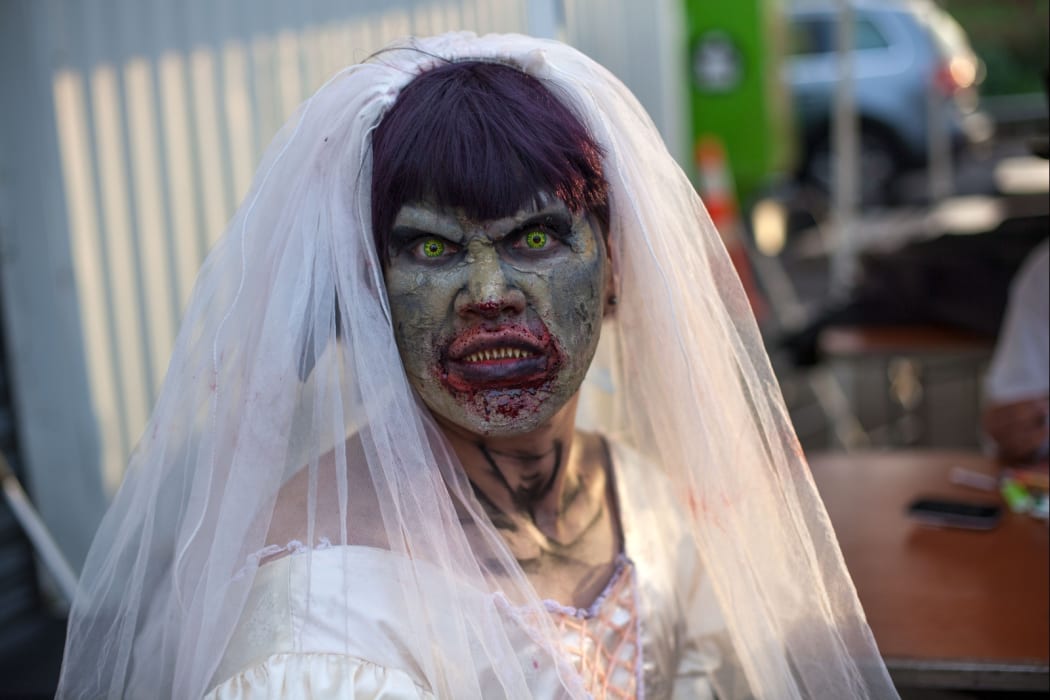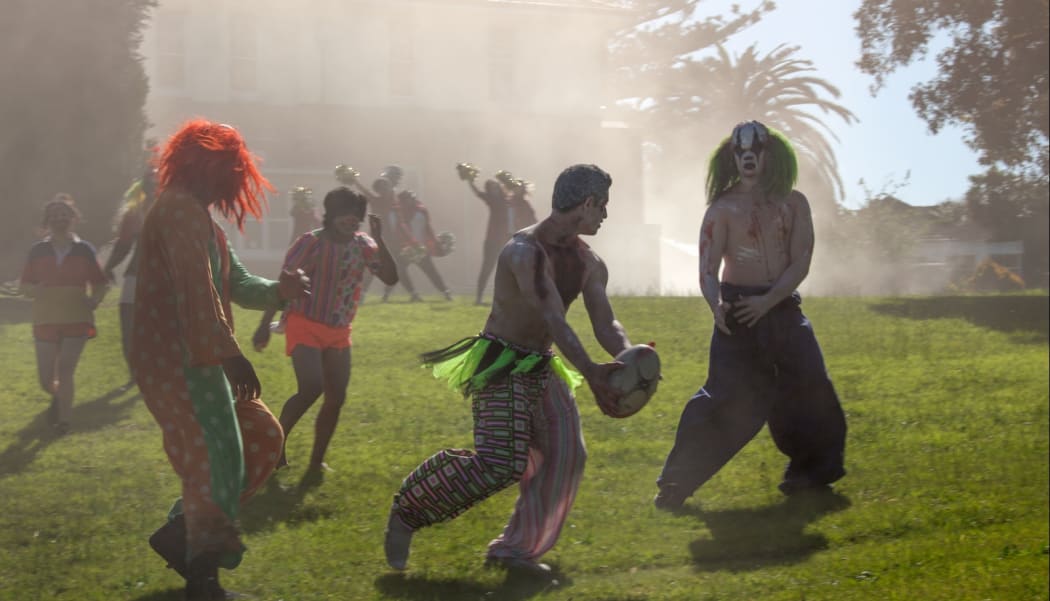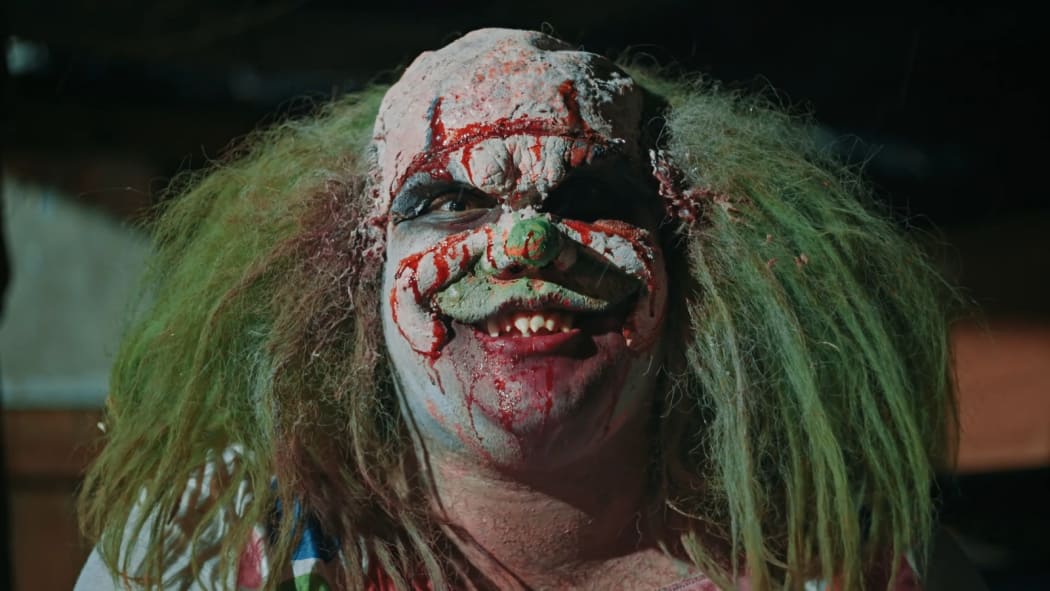It's the largest haunted attraction in the Southern Hemisphere, an Auckland institution and, now, a film. We talk to director Florian Habicht about the people and the past of Spookers.

Photo: Greta Anderson
If you’ve ever been to Spookers, you’ll know that it is scarier than it sounds.
There’s the drive down; a long passage down the southern motorway, flanked by tall trees that become silhouettes in the darkness.
There’s the location; sitting on the grounds of Kingseat Psychiatric Hospital in the former nurses hostel, the site is imbued with trauma and thought by many to be haunted.
Then, once you finally get there, there’s the The Haunted House; The Freaky Forest of Fear; Disturbia (described as a three-dimensional psychedelic clown experience); and Cornevil, a corn maze that is only open during the summer months.
Put them all together and it is hard to know what is most foreboding; but, like a doomed character in a horror movie, you’ve decided to go check it out.
Spookers opened 2005 and in the years since the theme park has become something of an Auckland institution. Open every Friday and Saturday night for visitors over 18 years of age, devotees pour in year round to test their nerves as actors dressed as demented clowns and brides and zombies scare the bejesus out of them.
It is now also the subject (and title) of a new documentary by renowned kiwi filmmaker Florian Habicht, which delves into the lives of the performers at Auckland’s infamous haunted mansion.
Prior to filming Habicht had never been to Spookers; nor had he given it much thought until Madman Production’s Suzanne Walker called him to talk about an idea she’d come up to make a film about it.
Habicht, in the middle of preparing to make a scripted drama, was not uninterested but held reservations.
“Maybe twice a year I get offered other films to direct”, he says. “But I've never found one that kind of I think I could make it my own film”
He agreed to take his camera along and do a test shoot, imagining afterwards he would be able to reply with a definitive no.
“But when I got to Spookers I was just like oh shit.
“I kind of like, loved the place.”
***
Known for his surreal, genre bending style, Habicht’s attraction to Spookers is perhaps not as unlikely as it might seem.
A graduate of the University of Auckland’s Elam art school, the Berlin born filmmaker has spent the better part of his career drawing visionary yet humanistic portraits of people and communities as diverse as they are fascinating.
From the inhabitants of a small Northland town in Kaikohe Demolition, to a Brit pop-punk band in Pulp: a Film about Life, Death & Supermarkets, to his own blurred reality of the self-starring Love Story, Habicht is non-discriminatory about who he will turn his curious, empathetic gaze on next. In this sense Spookers, and the people it documents, seems as though it will sit comfortably in his oeuvre.
Opened by ex-sheep farmers Beth and Andy Watson, six years subsequent to Kingseat Hospital’s closure, Spookers began life as a small operation.
“They got locals in, they got the local bank manager in to chase people with a chainsaw” says Habicht.
It was, he explains, “kind of a really kiwi do it yourself. It just went off, and then they just kept taking it further.”

Photo: Greta Anderson
Running it alongside their daughter Julia Tukiri, the family business has rapidly grown; so too has another kind of family, with the many amateur actors who populate the park. Arriving at Spookers for the first time, Habicht says he could tell that this unlikely community was special.
“As artists I was attracted to them”, he recalls. “They're all self-taught - like their makeup and their costumes and the characters they choose.
“I'm a good talent spotter I reckon.”
Spending time with them, he found that the diverse group had become a support network, Spookers a safe and inclusive space for them to experiment and come into their own away from a world where they felt like outsiders.
“Most of them are young, people that are still finding themselves”, says Habicht. It reminded him of the kind of community he himself found attending art school years earlier, and how he overcame shyness with the help of an adopted family.
It’s not hard to see why Habicht’s subjects - from the painted clowns of Spookers to the taciturn men of Kaikohe Demolition - feel so at ease with opening up to him.
Propelled by a kind of nervous kinetic energy, his demeanour is immediately warm and empathetic. He cares deeply about his subjects to the point of being protective, and speaks openly of his concern towards the more vulnerable members of the cast as the New Zealand premiere draws near.
He need not worry though, it seems. Reassured recently to see one of the film’s subjects share an article about Spookers on their personal Facebook page, Habicht ensures the cast are comfortable with the finished product, no matter what he may have captured on camera.
“Cos' I'm always in on the edit, that means I never have to worry when we're shooting.”
***
There is of course a distinct irony underlying the way Spookers is able to exorcise ghosts - so to speak - for visitors and employees, and it is one of which Habicht is keenly aware.
For of course the horror of the being chased by demonic clowns and zombie brides wielding chainsaws, pales in comparison to the history of Kingseat and the terrible things that went on there.

Photo: Supplied
Closed after nearly 70 years of operation after reforms to the Mental Health Act, the hospital was one of many New Zealand psychatric institutions thought to have mistreated and abused patients. By 2004 more than 200 people had filed complaints against the goverment for the practices of such institutions during the 1960's and 1970's.
“I find it decadent to be into horror”, Habicht says. “Our lives are so sweet that we can go to a horror place and get enjoyment off it.
“But whereas when I went there and found out about the history of the place, it was like oh fuck this is it. This is the horror. The horrors’ not in the scaring, and I don't see the scaring as that scary in the movie. For me it's more that people were locked up there for so many years.”
For those people Spookers is a source of contention, says Habicht.
“Because they don't want people to be making fun of what happened there and the people at Spookers don't really have an idea.”
It is a strange problem, and it is definitely easy to see why some might find the concept crass or even glib. Yet, for the community of people that the park facilitates, a history of abuse and cruelty is turned on its head. Habicht hopes that the film will give survivors of Kingseat a new perspective.
“I think when they watch the film they'll kind of know what Spookers is about. The fact that Spookers is doing so much for mental health, that's what fascinates me.”
***
Spookers will premiere next month at the New Zealand International Film Festival.

